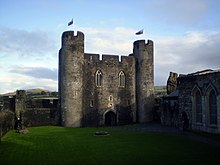Restoration - time of sensuality
| Movie | |
|---|---|
| German title | Restoration - time of sensuality |
| Original title | Restoration |
| Country of production | USA , UK |
| original language | English |
| Publishing year | 1995 |
| length | 113 minutes |
| Age rating | FSK 12 |
| Rod | |
| Director | Michael Hoffman |
| script | Rupert Walters |
| production | Sarah Black , Cary Brokaw , Kip Hagopian , Andy Paterson |
| music | James Newton Howard |
| camera | Oliver Stapleton |
| cut | Garth Craven |
| occupation | |
| |

Restoration - Time of Sensuality (Original Title: Restoration ) is an American - British drama from 1995 . Directed by Michael Hoffman , the screenplay was written by Rupert Walters based on a 1989 novel by Rose Tremain . Robert Downey Jr. played the leading role .
action
The young doctor Robert Merivel and his friend John Pearce were working in a London hospital in 1660. There a man is treated who lives with an unprotected heart. Merivel alone dares to touch the heart of what the English king learns.
Merivel is called to the court of King Charles II of England to look after his sick dog. The cure succeeds and the king rewards Merivel with a title of nobility and Bidnold , an estate in the country.
Charles II later demands of Merivel that the latter marry the royal mistress Celia without ever having sex with her. Merivel falls in love with his wife, the king banishes him from Bidnold. Merivel then works in a provincial hospital run by Quakers , in which, among others, the allegedly insane Irishwoman Katharine is hospitalized and in which his former friend John Pearce also works as a doctor. Merivel and Katharine start a relationship and she becomes pregnant, so they go back to London together. Merivel loses his clothes to a con man in a game of chance on the way, but Katharine wins the things back.
The doctor later cares for the victims of the plague in London under the name of his friend John Pearce, as he had died of consumption in the provincial hospital and he wants to preserve his memory. There are complications with the birth of his daughter and Merivel explains to Katharine that he could save the child by cutting open her stomach, but that would mean losing her. Then Katharine sacrifices herself and he can save his daughter. Merivel now looks after the child on his own and employs a nanny.
The king asks the supposed John Pearce to come to his court to treat Celia, who is afflicted by the plague. Merivel goes there under a mask and finds out that Celia is not sick with the plague, only has a fever and he can cure her. Meanwhile, a fire breaks out in Cheapside ( Great Fire of London ) and Merivel tries to find the nanny with his daughter in the flames, in the process he falls into a boat and is driven unconscious along the Thames to Bidnold, his former estate, where he is found Will Gates, the manager of Bidnold, nurses him back to health. After he wakes up, the king suddenly appears with the nanny and his daughter, Merivel is overjoyed. The king gives Merivel the property and title back, explaining that the doctor has changed. Charles II now promises never to take Bidnold away from him. Immediately thereafter, Merivel resumed his work as a doctor in London.
Reviews
Roger Ebert praised in the Chicago Sun-Times of January 26, 1996 the pleasure with which the sensual times of the late 17th century were shown. He had never before has such a rampant ( riotous ) representation of London seen this era. Ebert praised the remarkable performance of Robert Downey Jr.
Kevin Thomas wrote in the Los Angeles Times on December 29, 1995 that the director and screenwriter had succeeded in reproducing the fornication of the time. However, this is not enough to save the film from looking like an old-fashioned costume melodrama. Thomas praised the performances by Robert Downey Jr., Sam Neill, Hugh Grant, Ian McKellen, and Meg Ryan. The film music is elegant .
The Rheinische Post described the film as a showpiece and a great costume film .
Awards
The film won two Oscars in 1996 : for Best Production Design and for Best Costume Design . He was also nominated for a BAFTA Award in 1996 for James Acheson's costume design . Michael Hoffman was nominated for the Golden Bear in 1996.
backgrounds
The film was shot in England and Wales . Production costs were estimated to be $ 18 million and US theaters revenues were $ 4.1 million.
supporting documents
Web links
- Restoration - time of sensuality in the Internet Movie Database (English)
- Restoration - time of sensuality at Rotten Tomatoes (English)
- Restoration - Time of Sensuality ( Memento from April 30, 2017 in the Internet Archive ) in the Dirk Jasper FilmLexikon